|
Thurs., Aug. 30
1:00 p.m.
ILC ALCPG Physics and Detector R&D Seminar - West Wing, WH-10NW
Speaker: J. Goldstein, Bristol University
Title: Vertex Detector Mechanical Studies
1:30 p.m.
Particle Astrophysics Seminar - Curia II (NOTE DATE & TIME)
Speaker: R. Levine, University of Colorado
Title: From Megaparsecs to Milliparsecs: Modeling Supermassive Black Hole Environments with Cosmological Simulations
2:30 p.m.
Theoretical Physics Seminar - Curia II
Speaker: S. Martin, Northern Illinois University
Title: Implications of Compressed Supersymmetry with Natural Dark Matter from Annihilation to Top Quarks
3:30 p.m.
DIRECTOR'S COFFEE BREAK - 2nd Flr X-Over
THERE WILL BE NO ACCELERATOR PHYSICS AND TECHNOLOGY SEMINAR TODAY
4:00
Accelerator Physics and Technology Seminar - One West
Speaker: Z. Conway, Argonne National Laboratory
Title: Superconducting Multi-Spoke-Loaded Accelerator Cavities
Fri., Aug. 31
3:30 p.m.
DIRECTOR'S COFFEE BREAK - 2nd Flr X-Over
4:00 p.m.
Joint Experimental-Theoretical Physics Seminar - One West
Speaker: A. Herve, CERN
Title: Review of the Design Choices and Construction of the CMS Experiment
Click here for NALCAL,
a weekly calendar with links to additional information. |
Thursday, Aug. 30
- Tomato florentine
- Grilled chicken cordon bleu sandwich
- Chimichangas
- Smart Cuisine: chicken marsala
- Smoked turkey melt
- Assorted slice pizza
- SW chicken salad w/roasted corn salsa
*Carb Restricted Alternative
Wilson Hall Cafe Menu |
|
Thursday, Aug. 30
Dinner
Closed
Wednesday, Sept. 5
Lunch
- Cumin and Chipotle Glazed Pork Loin
w/Apple Salsa
- Roasted Sweet Potatoes
- Pear Tart
Chez Leon Menu
Call x4598 to make your reservation. |
|
|
Fritz Bartlett retires Aug. 31
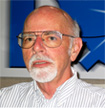 |
| Fritz Bartlett |
Fritz Bartlett uses humor to ease tensions, speed up productivity and to make the best out of less-than perfect situations.
Take retirement.
He's not taking it too seriously. Although Friday will be his official last day after a 30-year career at Fermilab, you can expect to see him again, and again and again.
His love of finding computing solutions for science will bring him back to work with DZero as it strives to automize to accommodate the influx of new data analysts without the in-depth knowledge gained from building a detector from the ground up.
"It took me almost the first year (of phased retirement) to begin taking time off. Who knows what I would have done if I had to do this cold turkey," said Bartlett, who works as an applied scientist II in the Particle Physics Division. "There are plenty of challenges left."
Bartlett started at Fermilab in the 1970s as a visiting scientist from CalTech working on some of the laboratories first experiments: E21, a neutrino experiment, and E111, a charge exchange experiment at the Meson Laboratory. He took a leave of absence to work on the beam line control system. When his future wife, Linda, decided to stay at Fermilab, so did Bartlett. He took on the Fixed Target program and later helped build the DZero detector in the mid-80s. It is there that his impact has been felt the most through his personality and computing knowledge.
"One of his excellent features was his sense of humor. Many difficult situations were released with laughs
after his remarks or jokes - it helped in many cases," said Dmitri Denisov, co-spokesperson for the DZero collaboration. "He was working with people from many groups, countries, regions, cultures and was always able to find optimal solutions and compromises as needed."
Gene Fisk, Particle Physics Division deputy department head, credits Bartlett with improving DZero's efficiency by serving as the project leader during the control group's creation of a control monitoring system. It manages the detector when it takes data and stops the flow of data at the first sign of problems.
"He has been on the forefront of the interface between experiments and their data acquisition systems, the flow of data and the phone line interactions," Fisk said.
While Bartlett plans to continue lending his knowledge to the laboratory, he also plans to squeeze in a little more fun by working on house projects and visiting old friends on the West Coast.
"I had a very good career, which is going to continue," he said.
-- Tona Kunz
|
Thailand goes tera: scientists connect to the power of ThaiGrid
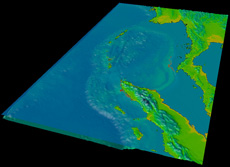
ThaiGrid powers this tsunami simulation, run by a team from Chulalongkorn University, Thailand, and focusing on the potential effects of tsunamis in the Indian Ocean.
Image courtesy of ThaiGrid
Scientists across the globe are cranking up their computing requirements: they want more processing power to tackle ever more challenging problems.
The wishes of Thai scientists recently came true when their first teraflop computing system went online as part of the Thai National Grid Project.
"Our demand for computational power and storage is increasing rapidly," says Putchong Uthayopas, director of the Thai National Grid Project.
"We had a need for a national computational infrastructure that would allow researchers to discover and explore more challenging problems," he says. "The Thai government decided that now was the right time to explore grids as a key infrastructure enabler."
Read More
|
"Cosmic train wreck" may derail theories of dark matter
From National Geographic, Aug. 22, 2007
New observations of a massive intergalactic collision are raising more questions about the mysterious nature of dark matter.
The study looked at three huge galaxy clusters that are merging into an even bigger cluster called Abell 520, located about three billion light-years from Earth.
Astronomers describe the collision as a "cosmic train wreck," given the immensity of the forces involved. Each cluster contains about a thousand galaxies, and each galaxy has billions of stars.
The new findings show an unprecedented mix-up in the merging clusters, suggesting the need for an "uncomfortable" revision-or entire rewrite-of our current theories of dark matter.
"Whatever happened did something really unusual to the galaxies," said study lead author Andisheh Mahdavi, an astronomer at the University of Victoria in British Columbia, Canada.
Read more
|
|
|
A beautiful road to the Higgs
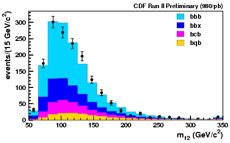
The mass of the two most energetic jets in each event. The observed CDF data are shown by the black points, while the colored regions show the contributions from the background sources.
The comprehensive Higgs program at CDF searches for the Higgs boson of the Standard Model and also carefully considers scenarios predicted by extended models such as supersymmetry. These models can have distinctive final states of three b or "beauty" quarks with high production rates compared to those expected from the Standard Model, giving CDF physicists a real opportunity to discover not only the Higgs boson, but also supersymmetry.
CDF has recently performed a search for the Higgs in the "triple-b" channel using one inverse femtobarn of data. These Higgs candidates are identified by searching for events with three collimated energy deposits called "jets" each containing charged tracks that are consistent with the decay of a b quark. Among these events, CDF physicists probe for a Higgs peak in m12, the combined mass of the two most energetic jets in each event. The non-Higgs backgrounds are estimated from CDF data and model the various ways that multiple heavy quarks can be produced in an event through ordinary processes of the strong force. A difference in the shape of m12 in the data compared to these backgrounds could indicate that there is something missing (like a Higgs boson).
CDF finds that the data are consistent with the estimated backgrounds, although there is a small excess of events at 140-150 GeV/c2. It is likely that this is due simply to statistical fluctuations in the data, but the researchers plan to quickly incorporate another one inverse femtobarn of newly acquired data in order to take a closer look.
Learn more
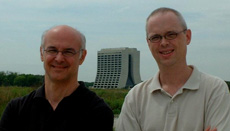
Dan Amidei (left) and Tom Wright, both of University of Michigan, search for Higgs bumps in CDF data.
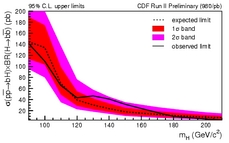
Upper limits on the cross section times branching ratio for the triple-b Higgs search. The observed limit (solid line) indicates a small excess around 140 GeV with respect to the expected limit if there were no Higgs (dashed line).
Result of the Week Archive
|
|
Have a safe day!
EAP Office hours Thursday and Friday
This week, the Employee Assistance Program Office will be open on Thursday, Aug. 30, and Friday, Aug. 31.
Fermilab Golf League outing Sept. 14
Fermilab Golf Leagues is sponsoring a final outing on Sept. 14, 2007, at Edgebrook in Sandwich, IL. The event will have a shotgun start at 8 a.m. Non-league members are welcome. The event cost is $45 and includes greens fees, cart and contests. The event will be stroke plat with handicaps. Cash prizes will be distributed to all league members who finish. A rough count is needed by Friday, Aug. 31, and payment is due by Sept. 5. Please contact and pay Alan Jonckheere at x3158,
Paul Czarapata at x3106, or your league representatives: Mike Matulik at x4091,
Pat Liston at x2332,
Don Arnold at x2871 or Rose Callaghan at x3535.
Weekly time sheets due Friday
With the upcoming Labor Day holiday, weekly time sheets are due in Payroll
by 10 a.m. on Friday, Aug. 31, 2007.
Recreation Facility 2008 memberships on sale starting Sept. 3
Recreation Facility 2008 memberships go on sale Sept. 3. Prices have stayed the same. A regular membership is $85 per year and graduate student rate is $55. New members that purchase a membership in September will get that month free. 2007 memberships expire Oct. 1, 2007, and 2008 memberships expire Oct. 1, 2008. More information can be found online.
Muscle Toning class begins Sept. 6
Get a head start in getting fit and have fun doing it by joining the Muscle Toning classes. Gain strength, lean body mass and increase muscle definition with the Recreation Facility strength training classes held on Tuesday and Thursday in the Recreation Facility from 5:30-6:30 p.m. The next class will run four weeks, Sept. 6-27, and will cost $36.
Gas station identity theft trend
A trend in identity theft has people getting their cars unknowingly robbed while they pump gasoline. Police across the nation warn motorists at the pump to either lock their doors or remove all valuables, like purses, from the vehicle. "I-Caught" television show featured the trend on its show this week and included the following video of how the criminals work.
Additional Activities |
|